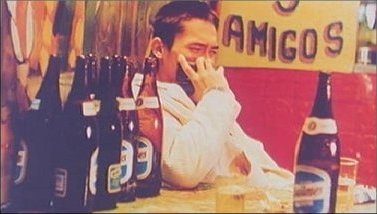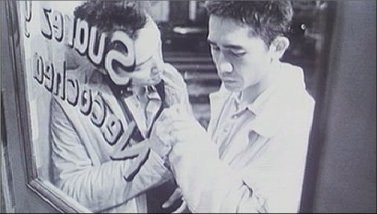|
Text and layout © Ed Shum, 2003. Ed Shum asserts the moral right to be identified as the author of this work |
|
Long Reviews |
|
Eventually, the issue of Leslie’s missing passport blows out and, in a burst of violence, Leslie storms out. Suddenly, we find a vacuum where the intense relationship once was, and the focus then follows how Tony hides his pain from others at work, particularly Chang. In this phase of the film, the emotional build-up is used to portray a searing canvas of pain and regret played out across all aspects of Tony’s life. And again WKW plays and suggests with the idea of a rebound/new relationship, just as he did in Chungking. |
|
But this time there is no magic solution to invade the life of a lonely heart. Instead, Chang has an almost over-real presence - somehow not a protagonist; somehow too solid - we can’t expect him to jump into Tony’s life. Indeed, there is no indication that he can fit a lover profile given that Tony doesn’t make clear to him his sexuality, and Chang remains ambiguous. |
|
Review of Happy Together (1997) |
|
|
|
...Continued... [Page 3] |
|
End |
|
But we do learn more about Chang and his outlook. In a nod to Tony’s character in Ashes (explicitly referred to when Tony says Chang looks like the Blind Swordsman) Chang professes to having had poor eyesight as a child, with the result that he has honed his hearing faculties in compensation. This quirky contrivance allows an insightful probe into the nature of technology and recorded emotion, in that Chang carries a tape recorder in much the same way that one might carry a camera. This forms a continuation of WKW’s fascination with the possibilities of memory and recorded emotion (the camcorder in Fallen Angels) as well as the idea of (both remarkably direct yet extremely elliptical) communication. |
|
These concepts appear in the scene (very clearly referenced to in the later, ITMFL) when Chang tells of his plans - now that he has saved up enough money to continue travelling - to visit the ‘end of the world’, Tierra Del Fuego. In response, Tony explains of a myth/legend: ‘I hear there’s a lighthouse there where people can leave their unhappiness at the end of the world’ - almost exactly identical to ITMFL’s whispering-into-tree myth. Chang then proffers Tony his tape recorder in order to record something to play at the end of the world. What follows is a scene both monstrously tragic yet also bizarrely comic as we see Tony trying to hide behind the tape recorder whilst Chang is on the dancefloor, yet Tony can find no way to hide his sadness and articulates it in the most humanely automatic manner by weeping into the recorder. |
|
In many respects, this is a high point of WKW’s expression. We have a classically oblique and artful contrivance, yet this results in unexpectedly direct and effective emotion. This is at a point in the film when Tony is at a post-relationship crossroads; the future now in flux with the classic WKW existential dilemma taking centre stage. |
|
Tony is also very alone. Whereas we previously saw him as one half of a couple, of which we could see both sides, now his pain is expressed unilaterally. Indeed, this representation of a lone individual emoting for and because of another person - who has now become absent or unreachable - is a classic WKW trope. This idea manifests itself in the memories of Takeshi and Tony of their ex-girlfriends in Chungking, and also in the separate pining of Michelle and Leon in Fallen Angels. This might be called unrequited love, but more generally what we see is a character expressing something, feeling something unilaterally; we see separation as deepening the profundity of our connection to the character. |
|
Teardrop: WKW contrives an outlet for Tony’s sadness which surprises us in its intensity. Though the tape is played to Chang by the end of the film, this communication is typically WKW: dilated, elliptical, but somehow all the more unique and compelling |
|
In fact, Happy Together is one of the rare WKW films where he shows two people in a state of togetherness which is the ‘norm’ from the outset, and then how they break apart. Other break-ups in WKW films are either already set in place without any concrete, present depictions of togetherness (the cops and ex-girlfriends in Chungking, or most of the relationships in Ashes), or there may seem to never be a state of togetherness (Fallen Angels). Notably, in ITMFL WKW excises close depiction of the existing relationships by the device of never showing the faces of the protagonists’ spouses. |
|
It seems that when we do see Tony alone, the film shifts to feeling more intimate and profound. WKW’s characters have always balanced on the cusp of accepting a relationship - they fear rejection, as WKW points out - and so solitude becomes the default position. Yet they also want love: they feel and want to have someone feel for them. Yet at the start of Happy Together it looks like WKW has shifted the default position. To see two lovers address each other with casual familiarity is almost a novelty in a WKW film (though it’s not unheard of: see Leslie and Carina Lau in Days). And though WKW does manage to refer to his characteristic themes and concerns (Tony’s insecurity harking back to fear of rejection; the characters, though together, also in a sense detached and alienated by their culture), the execution of the first half of the film feels inexplicably ‘less WKW’ than the second half. I use the phrase warily as there is no way of completely defining WKW (and it’s probably to his benefit if he ignores or thwarts such definitions), but there is a sense that when Tony finds himself alone we are closer to epiphany, closer to ‘waking up’ (as Tony refers to at the end of the film). |
|
|
|
The unforgettable fire: the preciousness of connection has always been one of the core factors of WKW, and Happy Together illustrates this by having a split between when the central couple are together and when Tony is on his own. This split is reflected in how Tony emotes and communicates and so the film is also split in tone |
|
And whilst we gauge Tony’s loneliness, we see him cruising the streets of Buenos Aires to a slow Frank Zappa tune. The heartbeat of this city, this ‘other’ city, flowing just slightly too fast for us to integrate, to understand, but so very real. This ground level documentary style is at once central to narrative and character, yet also - like the sequence with the Indians in Chungking - half voyeuristic, half celebratory. Part of the culture is alien, and also self-contained. The commonality is sex in this instance, but whereas disparate strangers come together in their sexuality there is no indication of mutual love. Of course, this is no analysis of homosexuality itself, but rather of the alienation of the central character as he can find solace in a unifying culture of sexuality (despite being in a foreign culture of nationality), yet he finds just as many lonely people who ‘all look the same’: a ‘culture’ is not the same as love for a person. |
|
|
|
There is now a palpable sense of motion in the film, from the giddy sped-up lights of Buenos Aires and also from the outlook and sense of direction which we finally see in Tony. A large part of this feeling is due to the filial theme which WKW, at a late stage, inserts in the film (a la Fallen Angels). Suddenly, Tony is at a phone booth calling his estranged father. Just as with Maggie’s final (crank?) phone call to Tony in ITMFL we do not hear anything concrete (or any reply at all). This is a classic WKW ‘test’ of suggestion, for all we have is a semi-introverted knowing smile from Tony - could his father be cursing him, or have hung up? Or are these the words of long-delayed reunion? Who knows - nothing is concrete in the WKW world. |
|
Page: |
|
Page: |

